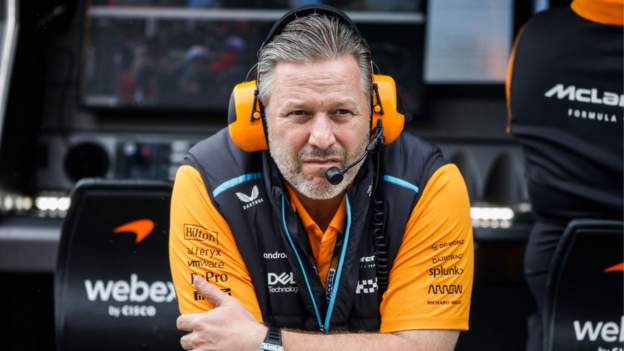McLaren has called for changes to Formula 1’s rules to make it easier for teams to pursue sustainability.
McLaren Racing boss Zak Brown says F1’s budget cap forces teams into pitching sustainability against competitiveness.
He added any changes would need to be planned to ensure they did not create loopholes that allowed extra spending.
“There needs to be a way to define areas you can spend outside the cap so we can work towards making F1 more sustainable,” Brown said.
F1 as a sport has made sustainability a central part of its future planning and has pledged to be net-zero carbon by 2030.
But the target presents major challenges for an activity that uses internal combustion engines and where the cars are largely made of carbon-fibre, which is notoriously wasteful to produce and difficult to recycle.
F1’s budget cap, which is set this year at $135m [£108.5m], is one of a number of mechanisms introduced into the rulebook in recent years in an attempt to close up the field and make the racing more competitive.
F1 is already planning to use carbon-neutral, fully sustainable synthetic fuel in new engines that will be mandated for 2026.
But Brown, McLaren Racing’s chief executive officer, said F1 could go further by creating “a clear regulatory framework with financial, technical and sporting regulations that better enable us all to innovate and invest in sustainability”.
He added: “Sustainability has been on the radar for some time. Now everyone is getting rightfully stuck into it, there are areas we think we can invest in sustainability technologies that may not bring a short-term performance benefit that are not really addressed in the financial regulations.
“So what we’d like to see is some adaptation of the financial regulations that allows you to clearly invest in sustainability, whereas (currently) if teams have the opportunity to invest in immediate performance benefit (in areas that) aren’t sustainable, there will be teams that make those investments.”
Brown said one of McLaren’s “moonshot” ambitions was to develop “a full circular race car”.
This is a car design in which a team would focus on minimising resources consumed, including using recycled materials, finding ways to expand their usage lifespan, and disposing of them correctly at end of life.
Brown said: “A lot of work would need to go into understanding: ‘Is that achievable?’ At the same time, you could make similar types of investments without having sustainability in mind to further develop your race car.”
McLaren director of sustainability Kim Wilson added that she believed the approach could be extended to the formulation of the 2026 technical regulations, on which discussions have already started.
“The technical regulations are an opportunity to create a level playing field for teams so that the regulations are driving us all to the same outcomes,” Wilson said.
“So, for example, it might be a certain proportion of the car needs to be made of sustainable materials without jeopardising the level of creativity for winning the constructors’ champions.
“But then we also have the opportunity to research and develop and the incentive to develop for sustainable material being used in the car.”























